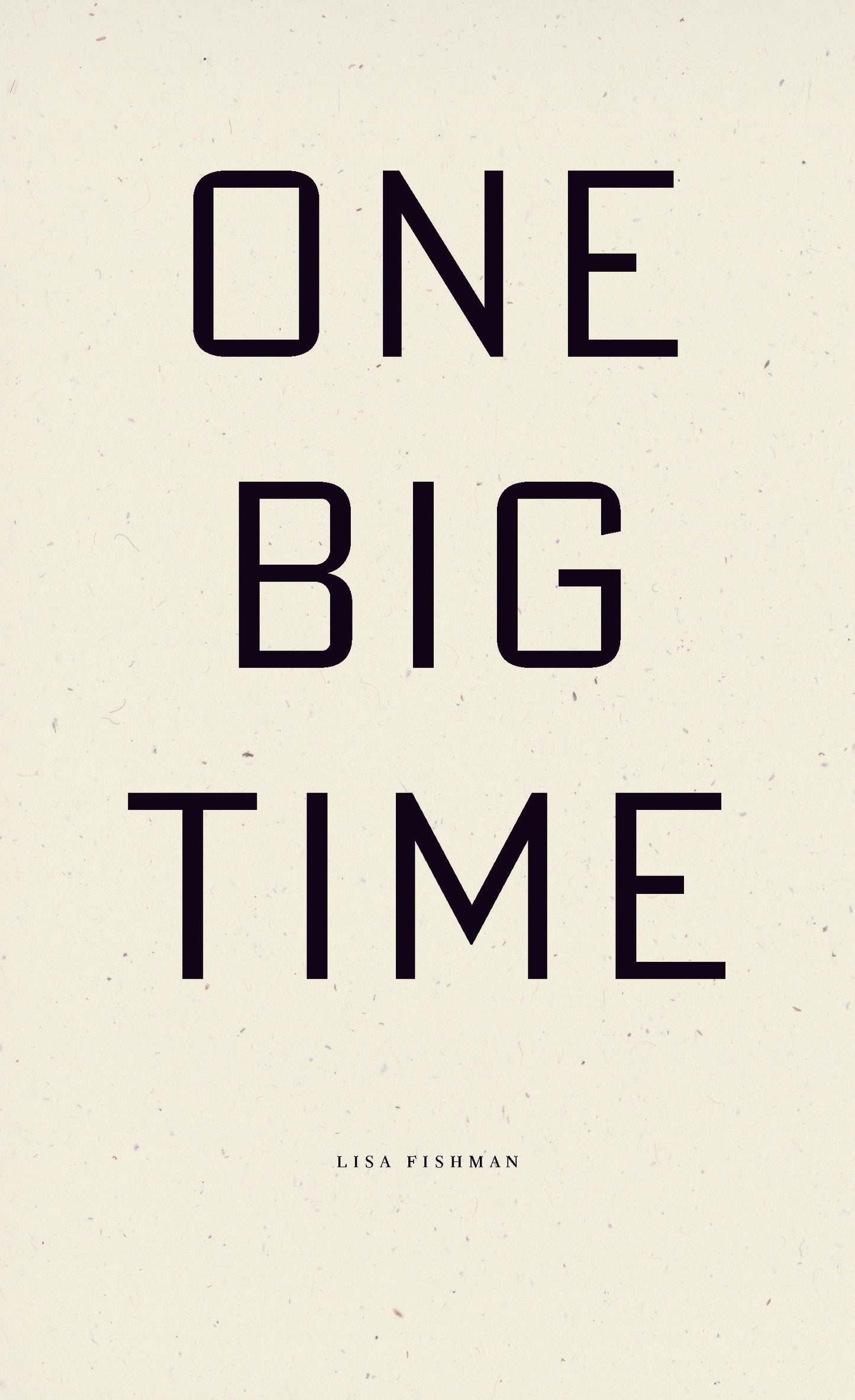
One Big Time
One Big Time
By Lisa Fishman
-
Lisa Fishman’s latest collection, One Big Time, is a one-woman quest narrative in a kayak, written during the author’s “journey-in-place” in Northeastern Ontario over a period of fourteen days in quarantine.
Here is Fishman at her most exacting and exploratory, in poems that hew with lyric precision to the immediate physical and geologic environment. At the same time, language is an alert, mobile life-form in active investigation of what one thinks one understands, and of where one thinks one is. While the narrator searches daily for a passageway from one body of water into another, words live in other words (“the hemlock / is a he / today”), and acrostics are illuminations: s-w-i-m is “sleek widening instant’s magnet.” Surprised by joy, these biocentric poems offer a way of being in the world with wonder and rigor––attentive enough to be lost, unknowing enough to be changed.
-
There’s a calm to this collection, even with the framing, the background, of uncertainty across that first Covid-era summer. There’s also something quite graceful to the subtleties of a smaller collection—the poems themselves take up but thirty of the fifty-six pages of this published book, allowing for a great deal of open space, which I very much appreciate here, and seems a smart and deliberate design-response to the requirements of the poems—one fully aware of the lyric geographies she moves through.
Rob McLennan
-
Lisa Fishman is the author of eight books of poetry, a short story collection, and several chapbooks. Her newest poetry book is One Big Time, out on Wave Books in spring, 2025. World Naked Bike Ride was published in Canada by Gaspereau Press in 2022 and was a finalist for the Canadian ReLit Award in short fiction. Other Wave poetry titles are Mad World, Mad Kings, Mad Composition (2020) and 24 Pages and other poems (2015). Fishman is also the author of three books on Ahsahta Press: F L O W E R C A R T (2011); The Happiness Experiment (2007); and Dear, Read(2002); the latter was selected by Brenda Hillman as a finalist for the Sawtooth Poetry Prize. Fishman’s other books are Current (Parlor Press, 2011) and The Deep Heart’s Core is a Suitcase (New Issues Press, 1996). Her chapbooks include at the same time as scattering (Albion Books, 2010), Lining (Boxwood Editions, 2009), KabbaLoom (Wyrd Press, 2008), and ‘The Holy Spirit does not deal in synonimes: a Transcription of Elizabeth Barrett Browning’s Marginalia in Her Greek and Hebrew Bibles’ (Parcel Press, 2008). A pamphlet, Deer 1, was published by Oxeye Press (2015) and Note on Niedecker’s Takuboku was published as a pamphlet by The Brother in Elysium (2015, expanded in The Wave Papers, 2016). Fishman’s work is anthologized in Best American Experimental Writing (Omnidawn, 2014, ed. Cole Swenson), The Ecopoetry Anthology (Trinity University Press, 2013), The Arcadia Project: North American Postmodern Pastoral (Ahsahta Press, 2012), Not For Mothers Only (Fence Books, 2007), American Poetry: The Next Generation (Carnegie-Mellon University Press, 2000) and elsewhere. She has relatively recent work in Granta, Spiral, Laurel Review, Denver Quarterly, Rapture, Oxeye, and other journals. A Pushcart Prize nominee and PEN/Robert J. Dau Short Story Prize for Emerging Writers nominee, Fishman continues to live primarily on the farm she and her husband started in 1999 in Orfordville, Wisconsin, dividing her time between Wisconsin and Canada. She is a dual US/Canadian with earlier roots in both the Detroit area and Montreal.
Publication: May 2025
ISBN# 9798891060142 (5.5x9, 64pp, paperback)
Couldn't load pickup availability


